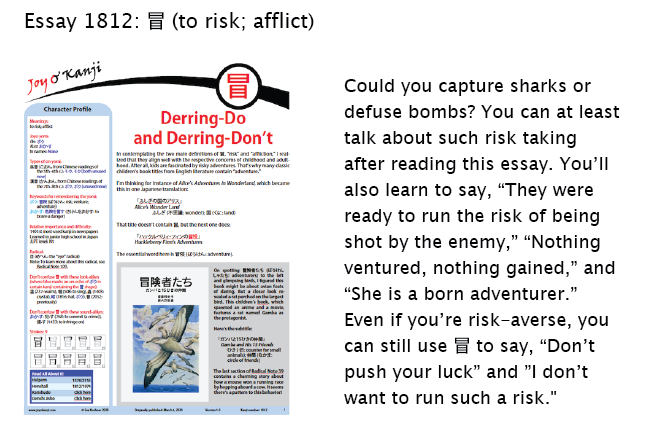The Infinite Possibilities
Yoga class reinvigorates me, especially when I feel a bit bored in a pose and glance around the room, spotting a kanji tattoo I haven't seen before. Recently, I discovered 逆 on the nape of one's woman's neck, just under her long black ponytail, and a subsequent conversation about it filled me with an excitement I haven't felt in awhile.
Carrying the Joyo readings ギャク, さか, and さか•らう, 逆 primarily means "inversion" or "to go against." The ponytailed student therefore chose just the right character to honor her seemingly absent father, a rebel with a motorcycle, as she later told me. After all, this kanji plays a part in terms for acts ranging from the boldly rebellious to the downright criminal:
親に逆らう (おやにさからう: to disobey one's parents)
弑逆 (しいぎゃく: murder of one's own lord or father)
反逆 (はんぎゃく: treason; treachery; mutiny; rebellion; insurrection)
When it comes to this character, things run counter to expectation:
逆説 (ぎゃくせつ: paradox)
吃逆 (しゃっくり: hiccup), where the first kanji is non-Joyo
逆玉 (ぎゃくたま: man who marries a wealthy or upwardly mobile woman; gold digger)
逆援 (ぎゃくえん: women paying boys for sex)
逆修 (ぎゃくしゅ: (1) holding a memorial service for oneself; (2) an older person conducting a memorial service for a deceased, younger person)
逆ギレ (ぎゃくギレ: being angry at someone who would normally be angry at you; situation wherein the offender is angry at the victim)
I love the last term. There's a word for that?!
Here's another contribution from the department of conflictual relationships:
逆恨み (さかうらみ: (1) being resented in return; (2) unjustified resentment through misunderstanding)
Though 逆 can involve misery, I can't help enjoying its fun side—the part that shakes up stodgy expectations and shows another way of being. Take, for instance, this word and its figurative spinoff:
逆立ち (さかだち: handstand; headstand)
逆立ちしても (さかだちしても: no matter how hard one might try; no matter what one does; even if one stood on one's head)
Incidentally, this discussion of 逆立ち wouldn't be complete without the next term:
逆上せる (のぼせる: to feel dizzy; have blood rush to one's head)
It's as if 逆 were meant to be in a yoga room, exactly as I found it!
I mentioned that 逆 filled me with an excitement I hadn't felt in awhile, and I wasn't talking about the moment I saw the tattoo dancing in and out of visibility under the moving ponytail, though that was thrilling. Rather, it was after that, when I explained the tattoo to our teacher and saw a light go on in his eyes. He doesn't know anything about kanji, but he immediately grasped that 逆 could convey "going against the grain" or "defying one's family," and he seemed transported by that idea.
Watching his face as it all sank in—as he considered the infinite possibilities of kanji, and its power to represent important concepts concisely—I felt something that I can barely put into words. Maybe it was akin to seeing someone taste chocolate for the first time and knowing how much joy awaits them, now that they know where to find it.
As long as we're talking about journeys into unknown worlds, the newest essay is about 冒 (to risk; afflict), which most often shows up in the word 冒険 (ぼうけん: adventure). Here's a sneak preview:
Catch you back here next time!
❖❖❖
Did you like this post? Express your love by supporting Joy o' Kanji on Patreon:



Comments